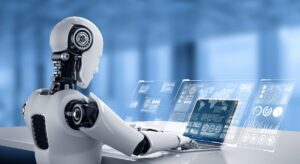Most Small Business Leaders Believe AI Will Be Essential for Workplace Safety

The Role of Artificial Intelligence in Small Business Safety
Recent findings from a report by Pie Insurance reveal that a significant number of small business leaders recognize the potential of artificial intelligence (AI) in enhancing worker safety. The survey, which involved input from over a thousand small business decision-makers, indicates that 64% anticipate AI will play an essential role in workplace safety over the next five years.
Embracing AI in Small Businesses
The survey highlights that a thriving 81% of small businesses are willing to integrate AI into their daily operations, with 44% already utilizing AI technologies. Carla Woodard, Senior Vice President of Claims at Pie Insurance, points out that smaller enterprises often lack the comprehensive safety resources that larger corporations possess. AI, she notes, can help these businesses proactively identify and manage risks effectively.
Benefits of AI Integration
Among the small businesses currently using AI, the results are promising. An impressive 97% reported boosts in operational efficiency, while 73% experienced improvements in workplace safety. Examples of AI applications noted in the study include:
- Safety Checklists and Guides: Tools like ChatGPT can assist in generating safety protocols and educational resources for staff.
- Real-Time Surveillance: AI-powered systems can monitor unsafe behaviors on the job, ensuring immediate responses.
- Predictive Analytics: This technology can forecast potential hazards before they manifest, allowing businesses to take preventive measures.
- Telematics for Driver Safety: AI systems can enhance the safety of vehicle operations by analyzing driving patterns and behaviors.
- Virtual Safety Assistants: Automated training solutions can provide employees with the knowledge needed to reduce workplace injuries.
Current Safety Challenges
Despite the positive outlook, the report notes that 75% of small businesses have reported workplace injuries in the last year. Notably, 44% admitted to improvising safety measures due to inadequate equipment. The most common types of injuries include:
- Mental health-related issues (22%)
- Slips, trips, and falls (20%)
- Lacerations and punctures (18%)
- Overexertion and repetitive strain injuries (13%)
Future of AI in Workplace Safety
Looking forward, Woodard believes that the adoption of AI will continue to grow, with enhancements in its capabilities. She anticipates that predictive analytics tools will become increasingly precise. These will include systems capable of monitoring machinery for signs of failure and emergency response systems that can detect dangers like fires and gas leaks more effectively than traditional sensors.
AI that can analyze employee movements and ergonomics will also play a crucial role by identifying risks that could lead to injuries. However, Woodard emphasizes caution regarding the reliability of AI. The tools’ effectiveness heavily relies on the quality of data they are trained on; hence, maintaining high confidence in their accuracy is critical.
Balancing AI and Human Oversight
While the benefits of AI are significant, Woodard warns against over-reliance on technology, which might create a false sense of security. She advocates for a balanced approach where AI complements rather than replaces human judgment in safety matters. Implementing clear protocols for situations requiring human insight is essential.
Financial Implications of AI Adoption
Interestingly, Pie Insurance has not yet offered premium discounts for small businesses that incorporate AI into their safety practices. However, Woodard highlights that leveraging technology can ultimately lead to considerable financial benefits. By preventing accidents and losses, businesses can save money while potentially lowering insurance claims and combating fraud.
In the evolving landscape of workplace safety, Woodard encourages agents and brokers to recognize AI’s capability to shift safety from a reactive stance to a proactive one. This transition can significantly aid businesses in identifying and mitigating risks efficiently.






